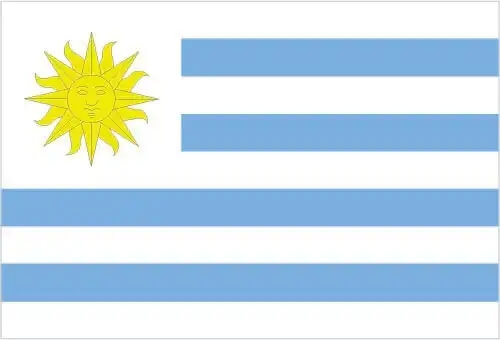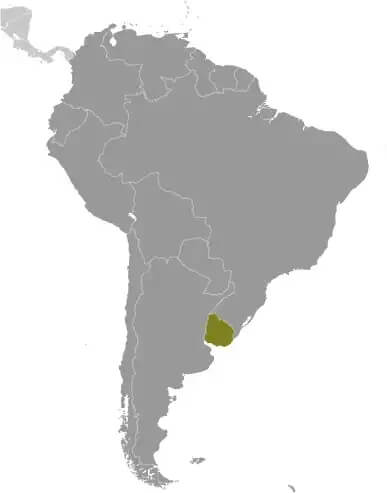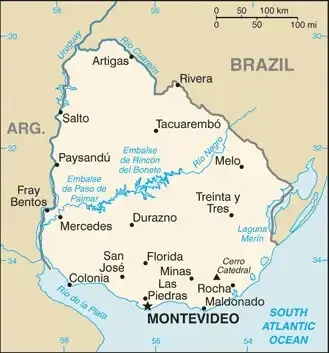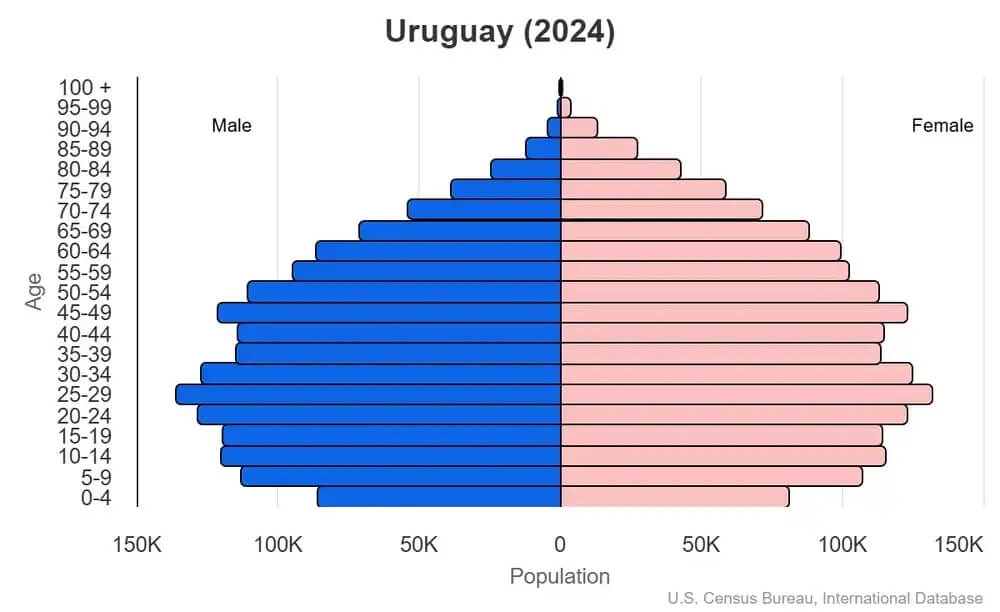World Book
Uruguay
World Book Index
75


With a score of 75, the country is ranked 41st out of 158 countries in the World Book ranking. (more information)
Introduction
The Spanish founded the city of Montevideo in modern-day Uruguay in 1726 as a military stronghold, and it soon became an important commercial center due to its natural harbor. Argentina initially claimed Uruguay, but Brazil annexed the country in 1821. Uruguay declared its independence in 1825 and secured its freedom in 1828 after a three-year struggle. Uruguay's political and labor conditions are among the freest on the continent.
Neighboring countries
Argentina - Brazil
Geography
Area
total: 176,215 sq km
land: 175,015 sq km
water: 1,200 sq km
Climate
warm temperate; freezing temperatures almost unknown
Natural resources
arable land, hydropower, minor minerals, fish
People and Society
Population
total: 3,425,330 (2024 est.)
Ethnic groups
White 87.7%, Black 4.6%, Indigenous 2.4%, other 0.3%, none or unspecified 5% (2011 est.)
Languages
Spanish (official, Rioplatense is the most widely spoken dialect)
Religions
Roman Catholic 36.5%, Protestant 5% (Evangelical (non-specific) 4.6%, Adventist 0.2%, Protestant (non-specific) 0.3%), African American Cults/Umbanda 2.8%, Jehovah's Witness 0.6%, Church of Jesus Christ 0.2%, other 1%, Believer (not belonging to the church) 1.8%, agnostic 0.3%, atheist 1.3%, none 47.3%, unspecified 3.4%
Roman Catholic 42%, Protestant 15%, other 6%, agnostic 3%, atheist 10%, unspecified 24% (2023 est.)
Population growth rate
0.26% (2024 est.)
Government
Government type
presidential republic
Capital
name: Montevideo
Executive branch
chief of state: President Yamandú ORSI Martínez (since 1 March 2025)
head of government: President Yamandú ORSI Martínez (since 1 March 2025)
Diplomatic representation in the US
chief of mission: Ambassador Daniel CASTILLOS Gómez (since 5 September 2025)
Diplomatic representation from the US
chief of mission: Ambassador-designate Lou RINALDI (since September 2025)
Economy
Economic overview
high-income, export-oriented South American economy; South America’s largest middle class; low socioeconomic inequality; growing homicide rates; growing Chinese and EU relations; 2019 Argentine recession hurt; key milk, beef, rice, and wool exporter
Real GDP (purchasing power parity)
$108.502 billion (2024 est.)
$105.231 billion (2023 est.)
$104.456 billion (2022 est.)
Real GDP per capita
$32,000 (2024 est.)
$31,100 (2023 est.)
$30,800 (2022 est.)
Exports
$23.329 billion (2024 est.)
$21.946 billion (2023 est.)
$23.56 billion (2022 est.)
Exports - partners
China 21%, Brazil 17%, USA 8%, Argentina 5%, Netherlands 5% (2023)
Exports - commodities
wood pulp, beef, milk, rice, wood (2023)
Imports
$19.117 billion (2024 est.)
$19.259 billion (2023 est.)
$19.639 billion (2022 est.)
Imports - partners
Brazil 22%, China 18%, Argentina 11%, USA 9%, Nigeria 4% (2023)
Imports - commodities
crude petroleum, refined petroleum, cars, trucks, fertilizers (2023)
Human Development Index
The country's Human Development Index (HDI) is 0.862, ranking it 48th out of 193 countries tested. (more information)
World Happiness Report
The World Happiness Report ranked the country 29th out of 158 countries tested with a score of 6.561. (more information)



